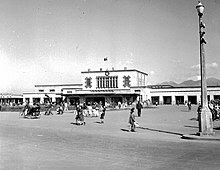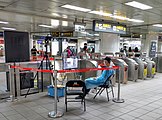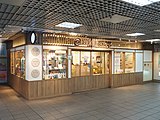Taipei Main Station
Station overview

The central building of Taipei Main Station is a rectangular building in Zhongzheng District with six stories above ground and four stories below ground. The building is 149 m (488 ft 10 in) long and 110 m (360 ft 11 in) wide. The first floor has a large ticketing hall with a skylight and three ground-level exits in each cardinal direction, the second is occupied by restaurants managed by the Breeze group, and all floors above are office spaces. At the B1 level, there are turnstiles for the TR and THSR platforms, along with a myriad of underground passageways for Taipei Bus Station, the Taoyuan Metro station, and Beimen metro station. Zhongshan Metro Mall, Taipei City Mall, Station Front Metro Mall, and Qsquare all connect on this level as well. TRA and THSR each have two island platforms at the B2 level. As for Taipei Metro, the Bannan line's platforms are located at the south of the station building; the entrances are at the B2 level, and the platforms are at B3. The Tamsui-Xinyi line's entrance is directly under the station building at B3, and the platforms are at B4.
Station layout
| 6F | 3F |
Taiwan Railways Administration offices |
Taiwan Railway, Scheduling Control Center TR Employee Rooms YMCA, other private companies (Rented) TRA Auditorium |
| 2F | Retail level | Taipei Station Breeze Center, Food Court (Elevator at East Entrance 2) |
| Restrooms | ||
| L1 | Street level | Entrance/Exit TRA/THSR ticketing, automatic ticket machines, tourism counter TRA Information Office, TRA Station Manager Office, railway police TRA information desk, THSR police, THSR military police |
| TRA Entrance/Exit, Guard | ||
| TRA Luggage Office | TRA Parcel Center (Separate structure) | |
| THSR Administration | offices | |
| B1 | Concourse | THSR ticketing, TRA/THSR automatic ticketing, ticket gates, waiting area Restrooms |
| Car park, Military Transportation Service | ||
| Connects to B1 of the Taipei Metro | ||
| Underground passageway | Zhongshan Metro Mall, Taipei Underground Market, Eslite Taipei Station, restrooms | |
| Connects to B1 of TRA/THSR, Taipei Bus Station | ||
| B2 | Metro Lobby | Information desk, faregates, restrooms (Inside fare area) Red line, Blue line transfer area, escalators to platforms |
| Metro offices (Separate structure) |
Metro Control Center briefing rooms | |
| 2A | TRA Control level | TRA Traffic Room, Central Station Monitoring Center |
| 2B | Platform 1A | THSR towards Zuoying (Banqiao) |
| Island platform | ||
| Platform 1B | THSR towards Zuoying (Banqiao) | |
| Platform 2A | THSR towards Nangang | |
| Island platform | ||
| Platform 2B | THSR towards Nangang | |
| Fifth track | West Coast line does not stop here | |
| Platform 3A | West Coast line towards Taichung, Kaohsiung (Wanhua) | |
| Island platform | ||
| Platform 3B | West Coast line towards Shulin (Wanhua) | |
| Platform 4A | West Coast line towards Keelung (Songshan) | |
| Island platform | ||
| Platform 4B | West Coast line towards Yilan, Hualien, Taitung (Songshan) | |
| TRA offices level | Staff training classroom | |
| 2C | Machinery level | Machinery |
| B3 | Concourse (Transfer to Metro TRA Entrance) |
TRA/THSR ticketing, automatic ticket machines, ticket gates Escalator to B2 – TRA/THSR platforms |
| Metro faregates, information desk, lost and found, gallery Restrooms (inside and outside fare zone), Automatic ticket dispensing machines One-way faregates | ||
| Platform 3 | ← | |
| Island platform, doors open on the left | ||
| Platform 4 | | |
| Control Center (Separate structure) |
High-Capacity Traffic Control Center (Another traffic center exists) | |
| B4 | Platform 1 | ← |
| Island platform, doors open on the left | ||
| Platform 2 | | |
-
The lobby of Taipei station, August 2018
-
The floor plan of the first floor of Taipei station, August 2019
-
TRA platform 3A, October 2018
-
TRA platform 3B, May 2019
-
TRA platform 4B, August 2015
-
A TRA EMU900 series train undergoing a test run at Taipei station, November 2020
-
THSR ticketing counters, August 2019
-
THSR platforms, February 2018
-
Taipei Metro Tamsui-Xinyi Line concourse, April 2020
-
EasyCard top-up machines at the Taipei Metro concourse
-
A Taipei Metro sourvenir shop at Taipei Main Station, 2020
-
An inauguration plaque of the Taipei Metro at Taipei Main Station
-
A memorial plaque with a demarcation of the record flood levels of Typhoon Nari on Taipei Main Station
-
Taipei Metro Tamsui-Xinyi Line platforms, August 2019
-
Taipei Metro Bannan Line platforms, August 2019
HSR services
HSR services 1xx, (1)2xx, (1)3xx, (1)5xx, (1)6xx, and (8)8xx call at this station. The first two southbound trains in the day are 803 (stops at all stations) at 06:26 and 203 (Taipei-Banqiao-Taichung-Chiayi-Tainan-Zuoying) at 06:30. Service 203 is the only train of the day that departs from Taipei Station, and does not depart from Nangang station like most southbound trains do. Although Service 203 departs four minutes later after Service 803, passengers traveling to major cities such as Taichung, Tainan, and Kaohsiung will save more time taking Train No. 203, while Train No. 803 would be more suitable for traveling to nearby cities such as Taoyuan or Hsinchu.
Around the station


(K)K Underground Mall
- Exit M1/Y2: TRA/THSR (Entrance North 1)
- Exit M2: Civic Blvd Expressway
- Exit M3: Cosmos Hotel Taipei/ Talk Club Taiwan(美立達留學遊學中心)
- Exit M4: TRA/THSR (Entrance South 1)
- Exit M5: Station Front Plaza
- Exit M6: Caesar Park Hotel Taipei, National Taiwan Museum
- Exit M7: Zhongshan N. Rd.
- Exit M8: Gongyuan Rd, YMCA Taipei
(M)Zhongshan Metro Mall
- Taipei Bus Station
- Q Square
- Museum of Contemporary Art, Taipei
- Zhongshan Station (R11, G14), Shuanglian station (R12)
(Y)Taipei City Mall
- Palais de Chine Hotel Taipei
- Taipei Station Wholesale Market
- Beimen (G13)
- Taipei main station (A1), Taoyuan International Airport MRT
(Z)Station Front Metro Mall
- Taipei West Bus Station Terminal A
- Shin Kong Mitsukoshi Department Store
- Guanqian Rd, Land Bank, Taiwan Cooperative Bank
- Chongqing S. Rd, First Bank
- North Gate
- Taipei Post Office of Chunghwa Post
History


The first rail station in Taipei was completed in Twatutia in 1891, during Qing rule, when the railway to Keelung was opened for service. Initially, a temporary station was built while a permanent station was constructed in 1897, during Japanese rule (1895–1945). In 1901, the station was located to the east of its current location. It was rebuilt in 1940 to accommodate growing passenger traffic.
To alleviate traffic congestion caused by railroad crossings in downtown Taipei, an underground railway tunnel between Huashan and Wanhua was built along with the present station building as part of the Taipei Railway Underground Project. When the underground system was completed on 2 September 1989, railway service was moved to the newly completed building (completed on 5 September 1989) and the old building as well as a temporary station were demolished.
The current station was further expanded with the opening of the Taipei Metro. The metro station is connected to the basement of the railway station and opened to passenger traffic in 1997 to the Tamsui–Xinyi line. It became a massive transfer hub with the opening of the Bannan Line in 1999. Extensive underground malls now exist at the front and back of the station, which emulate those found in Tokyo and Osaka, Japan. The station also became a terminus for Taiwan High Speed Rail trains when the network began service in 2007.
Ongoing developments
Taipei station and the area surrounding it have been undergoing renovation since 2005. Japanese architect Fumihiko Maki was chosen to design two skyscrapers that will surround the railroad station. Maki will also oversee the renovation of Taipei station. The height of the taller tower will be 76 stories, whereas the shorter tower will be 56 stories. The two skyscrapers will be constructed on empty parcels found adjacent to Taipei station, above the Taoyuan Airport MRT station.
The station interior underwent renovation work from February to October 2011. Basement restrooms were renovated, the basement and first floor preparations for additional Breeze Plaza retail space began, the large ticket office in the first floor lobby was removed, and additional retail space was allocated. In addition, the flooring on the first floor was completely replaced, fire and evacuation regulations were improved, and solar panels will be installed on the station roof.
See also
References
Notes
References
- ^ "車站基本資料集". Taiwan Railways Administration. Retrieved 3 November 2018.
- ^ 高鐵沿線里程座標相關資料. data.gov.tw (in Chinese). Retrieved 30 August 2018.
- ^ 各站營業里程-1.西部幹線. Taiwan Railways Administration (in Chinese). 11 December 2008. Retrieved 29 August 2018.
- ^ 臺鐵統計資訊. Taiwan Railways Administration (in Chinese). Retrieved 30 August 2018.
- ^ 車站數-按等級別分 (PDF). Taiwan Railways Administration (in Chinese). Retrieved 30 October 2018.
- ^ Lee, Yung-chang (April 2017). A Living Landmark (PDF). Taipei, Taiwan: Taiwan Railways Administration, MOTC. ISBN 978-986-05-1933-4. Retrieved 31 August 2018.
- ^ 臺北車站地下化. Railway Reconstruction Bureau, MOTC (in Chinese). Retrieved 30 August 2018.
- ^ 臺灣鐵路電訊. Taiwan Railways Administration (in Chinese). Retrieved 4 September 2018.
- ^ 計畫介紹- 高鐵建設- 台灣高鐵. Railway Bureau, MOTC (in Chinese). Retrieved 29 August 2018.
- ^ Taiwan Railway Corporation (June 2024). "表6 各站客貨運起訖量 Table 6 Volume of Passenger & Freight Traffic". 中華民國112年臺灣鐵路統計年報 Statistical report of Taiwan Railways -2023- (Report) (in Chinese (Taiwan) and English). Taiwan Railway Corporation. pp. 20–31. Archived from the original on 22 May 2024. Retrieved 16 August 2024.
- ^ "Chronicles". Taipei Metro. 5 December 2013. Retrieved 29 August 2018.
- ^ "Passenger Volume at Taipei Rapid Transit Stations". Taipei Mass Rapid Transit Co., Ltd. 15 January 2021.
- ^ "Taipei Main Station gets facelift on 125th birthday". The Straits Times. 29 July 2016.
- ^ "Taipei Main Station Information Map" (PDF). Taipei Metro. Retrieved 25 February 2021.
- ^ 鍾志鵬 (3 July 2020). "老照片故事/34年前台北車站這樣擠月台 竟然有陽光" (in Chinese (Taiwan)). SET News. Retrieved 25 February 2021.
- ^ Everington, Keoni (22 July 2017). "New 3D map of Taipei Main Station complex". Taiwan News. Retrieved 25 February 2021.
- ^ "Building History of Main Routes of Taiwan Railway". Taiwan Railways Administration. Retrieved 16 June 2010.
- ^ Davidson (1903), p. 249.
- ^ "Taiwan Railway History". Taiwan Railways Administration. Retrieved 16 June 2010.
- ^ MacDonald, Phil (2007). Taiwan. National Geographic Books. p. 59. ISBN 978-1426201455.
- ^ "Japanese architect wins design bid". Taipei Times. Deutsche Presse-Agentur. 20 July 2005. p. 11. Retrieved 17 June 2010.
- ^ "Diaphragm Wall and Foundation Piles Construction of Taipei Main Station JD Buildings". Department of Rapid Transit Systems. 1 July 2011. Retrieved 22 July 2011.
- ^ 2–10月大翻修 台北車站黑暗期來了 (in Chinese). 中國時報. 17 January 2011. Archived from the original on 20 January 2011. Retrieved 25 January 2011.
Bibliography
External links
- THSR Taipei Station
- TRA Taipei Station
- TRTC Route Map & Timetables
- Han Cheung (30 August 2020). "Taiwan in Time: From 'railway wharf' to national transport hub". Taipei Times. Retrieved 30 August 2020..














